“And that music is so powerful that it's quite beyond my control and, uh, when I'm in the grips of it I don't feel pleasure and I don't feel pain, either physically or emotionally.
Do you understand what I'm talking about?
Have you ever, have you ever felt like that?”
Across this spring and summer a number of seminal and highly influential post-rock releases hit their 25 years+ mark, which are as follows:
Sigur Ros - Aegis Byrjun - 25
Mogwai - Young Team - 27
Mogwai - Come On Die Young - 25
GY!BE - Slow Riot for Zero Kanda - 25
GY!BE - F♯ A♯ ∞ - 27
Those 3 artists above provide possibly the blueprint for all post-rock and post-metal (or any bands utilizing a slow, quiet build up to loud crescendo) that was to follow over the preceding years and are usually still the most common reference points for all things instrumental, guitar-based and pretty/sad/”epic”. It’s interesting to revisit them as undoubtedly great records, to hear the origins of a sound before it got slightly flattened by ‘shimmering tremolo harmony’ overkill.
What struck me about these anniversaries was recalling where post-rock sat in my musical history in terms of it being a pre-internet discovery. Hearing Like Herod blasting through my older brother’s bedroom walls was certainly an experience, a huge contrast to the pop-punk/grunge/nu-metal I was listening to when growing up.
In the pre-internet, pre-vinyl revival era, the CD was king. It allowed 74 minutes of uninterrupted audio and thus could capture the sprawl and expanse of those albums in all their glory. To my teenage self the very notion that an album could have songs over five minutes long, let alone 20-30, was mind-bending and actively made me listen to music in a new way.
Likewise, the often very minimalist layout and packaging of the albums with zero band information, confusing and obtuse track-lists and song titles, beautiful artwork and touches like embossing and letter-pressed covers, meant there was a real sense of mystery and gravitas to the genre. The discovery of actually finding albums to buy in a music shop, again, pre-internet with no ability to just buy online. Similar to punk, post-rock provided another world for my teenage brain to be beckoned towards.
Dead Flag Blues
All of those elements combined into music that felt incredibly and earnestly profound, aligning with the angst of teenage years and a sense of almost euphoric abandonment - this was different, this music meant something, it wasn’t like pop, this was ART. An audio landscape that you could pour yourself into, something that felt beyond and outside of yourself in a way that you couldn’t really put into words.
In the post-post-post-post ironic 2024 it seems almost painfully naive as to how serious post-rock fans were. It is definitely arguable that for such an expansive sound, post-rock’s fanbase was pretty inward-looking and it was only really Mogwai who had a sense of humour. That all being said, it was also a hell of a time to have music affect you in such a way and I loved the horizon-expanding, po-faced sense of drama to it all.
Post-rock’s ability to make the ordinary and hum-drum seem beautiful, the world now awash with cinematic pathos and significance was perfectly-timed with the ending of adolescence, entering a world that was bigger, stranger and more complex than you could imagine. Self-awareness was not something you were necessarily going to be cultivating in your late-teens (even if if it felt like you were), but the oncoming tragedies and triumphs of adulthood now had their soundtrack.
When the actual disasters came however it suddenly didn’t seem quite so beautiful.
That soundtrack would turn out to score two decades of war and social crises, including but not limited to 9/11 and the War on Terror, the 2008 Global Financial Crisis, Austerity, Brexit, the COVID19 pandemic, ongoing wars in Gaza and Ukraine, not to mention other conflicts across the world.
The genre’s post-apocalyptic splendour fades quite quickly against such a backdrop, “The skyline was beautiful on fire, all twisted metal stretching upwards…” has a different resonance when you’re not living under daily airstrikes or occupation.
The Sky Suspended
On the subject of album anniversaries, it’s been 15 years this summer since Fall of Efrafa recorded and released our final album Inle.
We decided to go out on a bang with our longest record and one in which we leant fully in to our slower influences. Written over two years with a lot of material jammed out in our practice space in Brighton, it was us at our most expansive and regal.
Holed up for a week in the Devon countryside we finally had a chance to take our time with the recording process as previous records had been made under much tighter deadlines (which give them their own ferocity and tension that I’m a fan of!). Inle was recorded live, with us all playing in the same room with I think an extra overdub of each guitar. This gave us more time for vocals which was a first for us as poor Alex used to have to cram them into the end of our sessions (and always delivered), but it was nice for the last album to have a sense of us catching our breath and letting it have it’s own pace. I’m really happy to have a document of us playing so well and an accurate capture as to what we sounded like live in that last year as a band.
We released the record that summer, did a last European tour, a final couple of shows in the winter and then Efrafa was put to rest.
I think it’s understandable that I then moved away from all things ‘post-’ for a while, I think partly to take stock of the band ending but also I think because of how much I inhabited the material as we were writing it. Perhaps it’s the nature of being a bass player, or just how my brain works, but I felt fully entwined with those bass lines and songs. Embodiment, flow, congruence, absorption - whatever you wanted to call it, I didn’t know where I ended and they began . When you’re someone who uses music as a bit of a refuge, and when you’ve put so much of yourself into something having some breathing space is essential.
The previous five years had been made up of a co-dependent relationship with bands like Cult of Luna, ISIS, Envy, Pelican and then later Neurosis. Endless stretches of motorway on tour, or late night hangouts were spent in their company. Labels such as Hydra Head, Level Plane and Robotic Empire were releasing records by bands that Heartattack zine rather snootily referred to as “…having too many guitar pedals” but to my ears it was great to have that sense that ‘post-’ music could exist in small venues and DIY spaces, that actually being able to play slow, atmospheric songs amidst a throng of people was one of the best experiences you could have and that genre-orthodoxy was far less important than attitude and passion.
However, nothing lasts forever, from the start of 2010 I was finding it harder and harder to generate or feel that same level of excitement and passion for a musical style that I’d been obsessed with. Had I simply heard too many bands? Those that I loved had either gone on hiatus, or were releasing albums that just weren’t doing it for me as much. Had the genre and style become rote and tired rather than instinctive to my ears?
My tastes broadened towards Cascadian Black Metal (no surprises there!), Doom, Classical and Ambient/Drone, an amplifying of my internal audio landscape and perhaps just a reflection that my time with post-rock and post-metal was drawing to a close.
Or so I thought.
The Doorway
Manchester’s Pijn released their second album From Low Beams Of Hope on June 28th of this year. Six years on from their previous record Loss, they’ve delivered an album that is a real testament to taking your time with things. Bucking all trends by existing on a timeline that feels completely separate from most things happening in the UK scene, they’re able to play with a variety of more abrasive acts but only sounding like themselves. Which, for an instrumental heavy post-rock band is quite an achievement.
Melding a variety of different instruments, as well as extra percussion, electronic samples and textures, Pijn have made an album that is both intimate and expansive, honed with adroit instinct and confidence. Weaving songs with a dynamic sense of rhythm, and utilising repetition in a way that the genre is famous for, there is however always a sense of direction and momentum to From Low Beams Of Hope.
‘Post-’ music can often write itself into a bit of corner, wherein if it’s too repetitive it becomes a kind of dulcet sludge and if it shifts too much it loses sight of the thread of the song and the instinctive ‘yearn’ that makes this genre so satisfying, and Pijn avoid both of these with real conviction.
Agrestic and pastoral guitars and strings merge with driving bass and drums, the heavier moments unleashed discerningly such as Carved Expanse’s transformation from lilting cadence to John Williams thunder. Side B of the album feels more post-metal with my two favourite tracks on it, On The Far Side Of Morning hitting a particular emotional highpoint for me of exultant guitars and keening strings, a fine example of the ‘melancholic triumph’ I’ve discussed in this newsletter before.
A Thousand Tired Lives closes the four tracks in suitably despondent manner, cycling through winding tense moments before lurching into an absolutely crushing final section as guitar and woodwind ignite into crimson balefire, the autumnal hues of Times Of Grace and A Sun That Never Sets just over the horizon. It ends a record that feels perfectly paced.
So Did We
I met Joe Clayton, the creative force behind Pijn and also recording engineer at No Studio when recording my vocals for Morrow’s The Quiet Earth. We immediately hit it off with a shared musical background and touring experiences (and appreciation for some of South Manchester’s best pubs), and found we had much to talk about.
One subject we‘d always return to was the impact of labels like Hydra Head and Constellation Records had on us, championing artistic independence and freedom, but also having a cohesive ‘sound’ or vibe to them. As well as an admirable commitment to making releases with beautiful and creative artwork, to make records that felt complete, and weren’t solely focused on the transactional bottom line of how many units and products had been shifted.
It’s no surprise then that in the build up to the release of From Low Beams Of Hope that Joe set up his own label, Floodlit. Serving not only as a home for all things Pijn, it is also “…dedicated to supporting artists that inspire.”, and I think over time will develop a really interesting roster. Alongside this is the almost unspoken agreement/credo of doing things DIY/fully Independent which is no one will take as much care or time about this as you will so it might as well be you.
It’s really lovely to see how the care taken with Pijn’s music is reflected in how much care has been taken with the design and production of layout and artwork across different formats, all masterfully handled by Fraser Briggs at Misc Print Co. It is also incredibly cool that they “hid” an ambient album in the artwork for the first month of release.
All of this combines into a record that feels for me like a beautiful melding of past and present, carrying the inspiration and passion of youth into a more sage and perceptive maturity. That perhaps it’s not that music is not hitting me in the same way that it used to when I was younger, just that I am taking a bit more time and appreciation with it, that the space and distance between increases connection.
You can purchase copies of From Low Beams Of Hope from Pijn’s bandcamp
https://www.nostudio.co.uk/
https://www.floodlitrecordings.com/
CODA
Also, just when we needed them most, Godspeed You! Black Emperor have a new album out on October 4th.




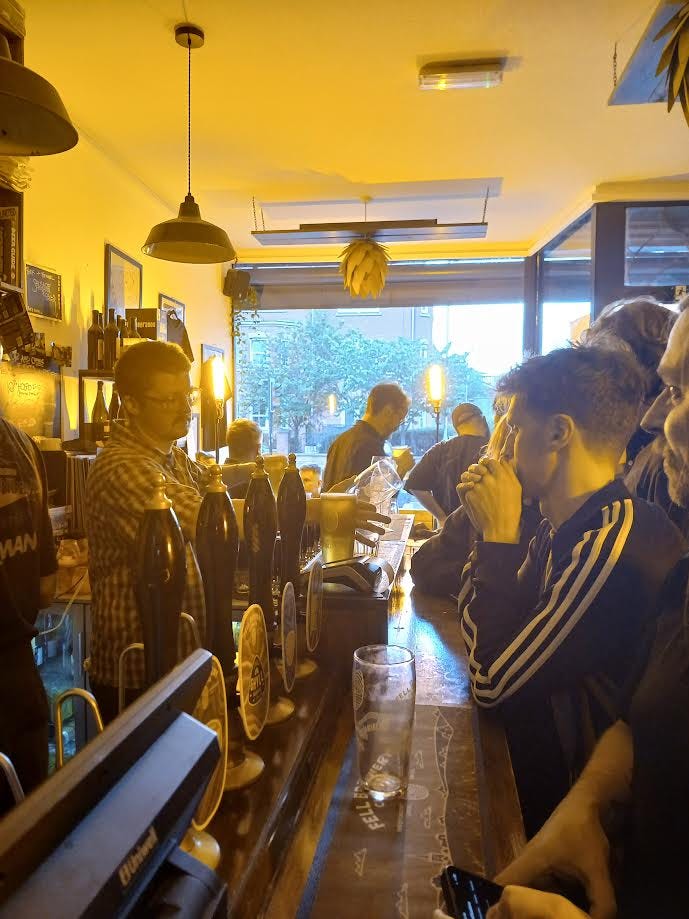
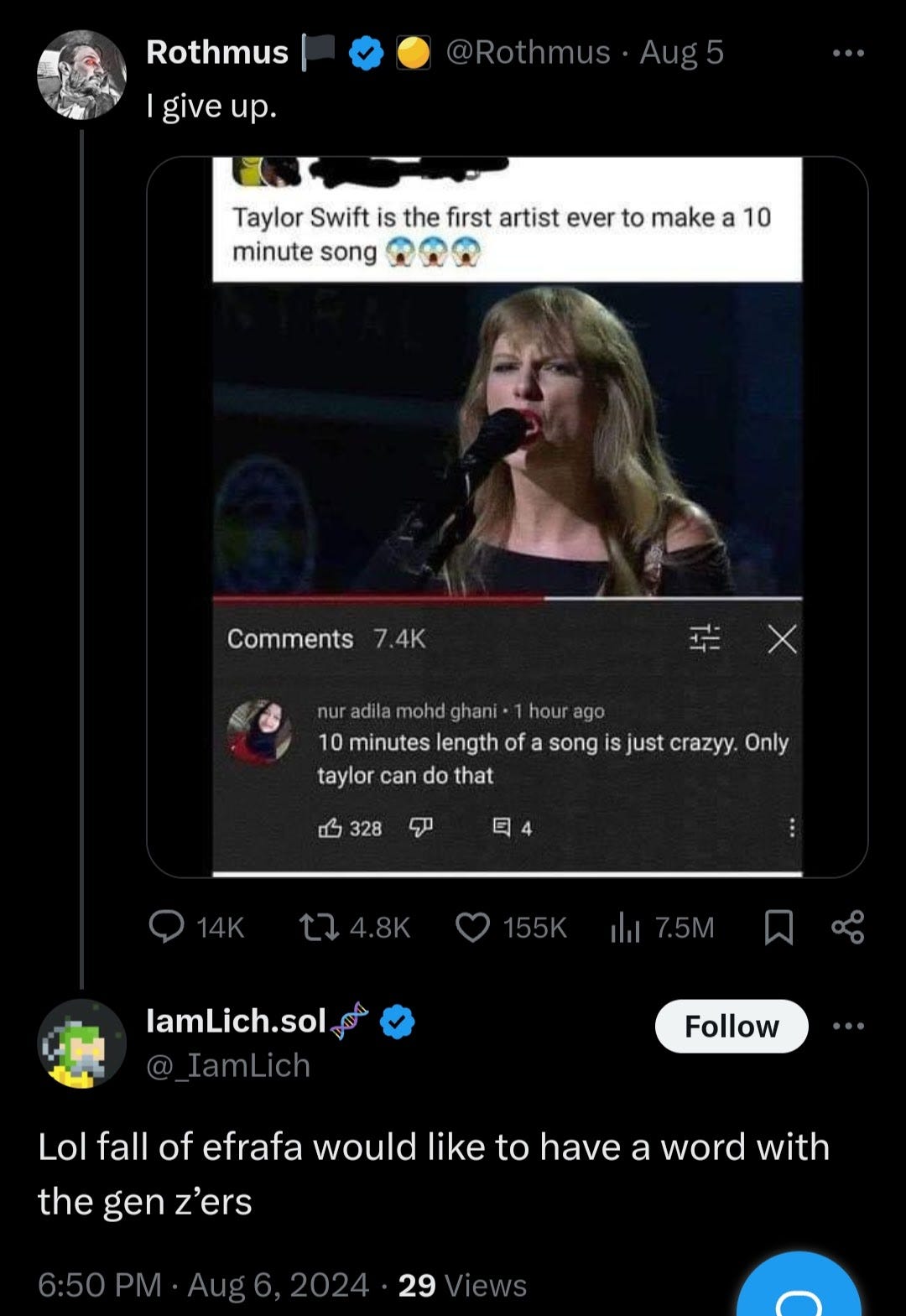

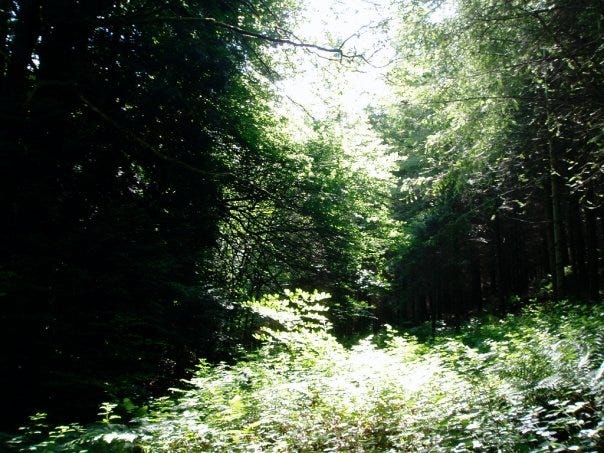
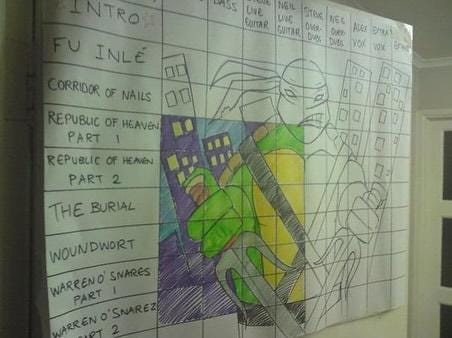
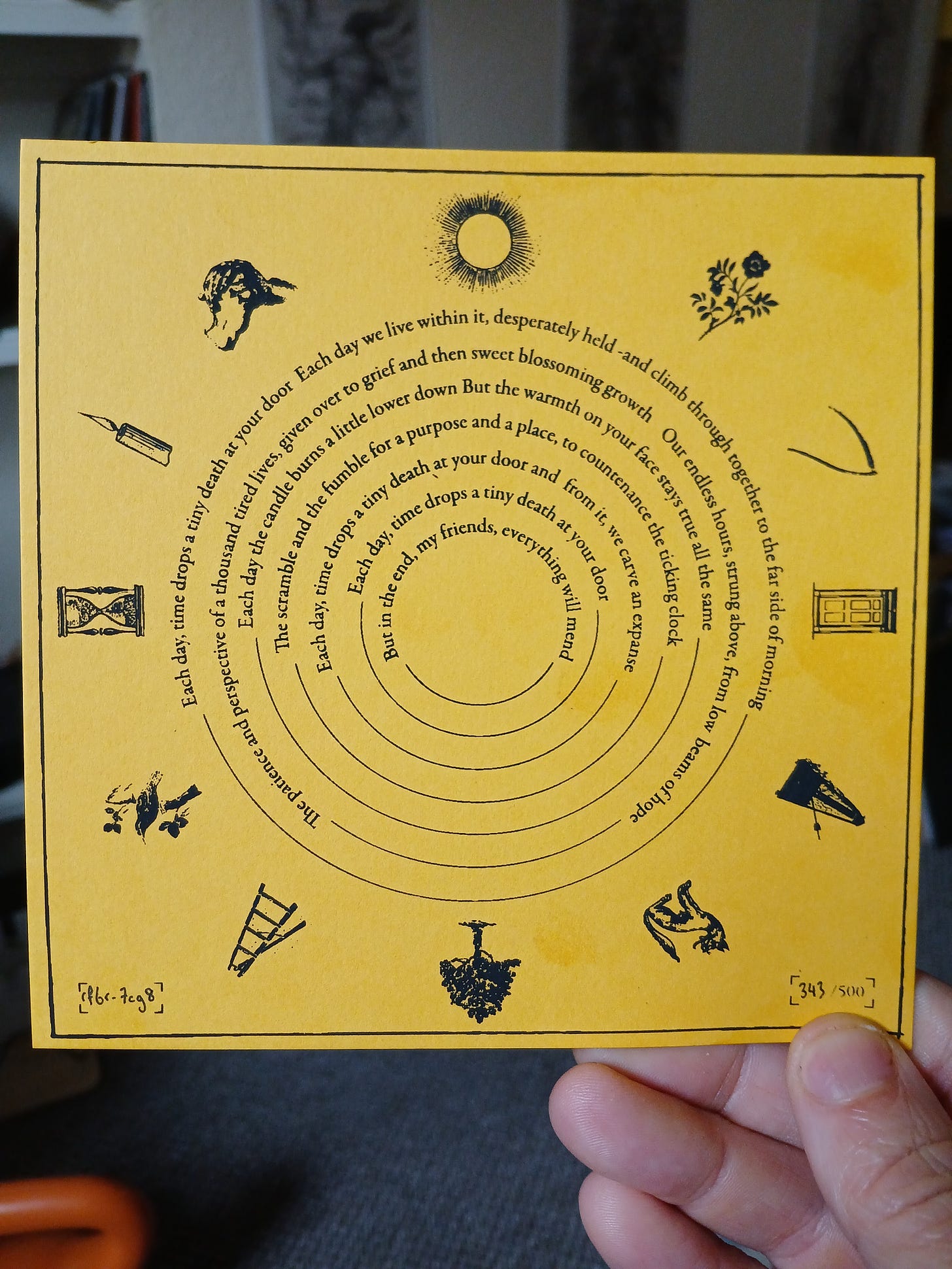


I shared this post with one of my friends with who I grew together seeing post rock becoming a thing, and he said, "And don't forget that this year is also 25 years since Tarentel's From bone to satellite!". And turns out this was one of those cases when a band slips between the cracks, because I had not listened to Tarentel. Now that I have given a couple of listens to the album, I cannot believe I had oversighted it all these years.